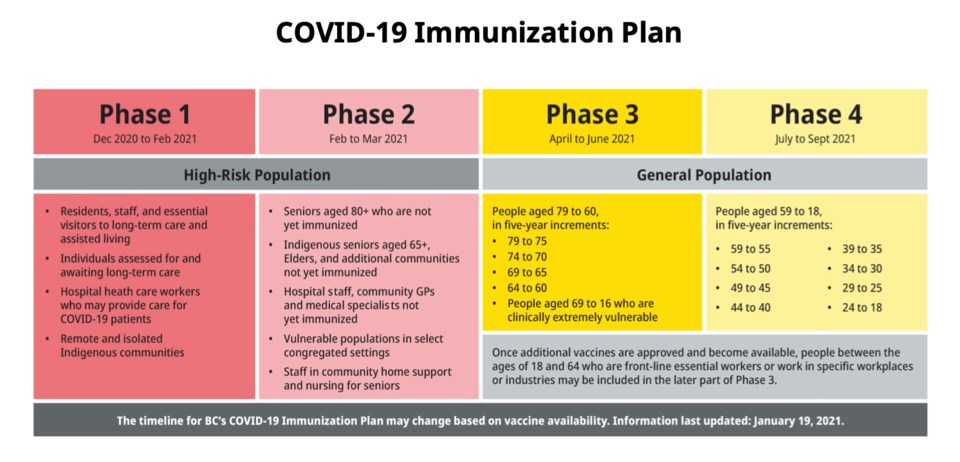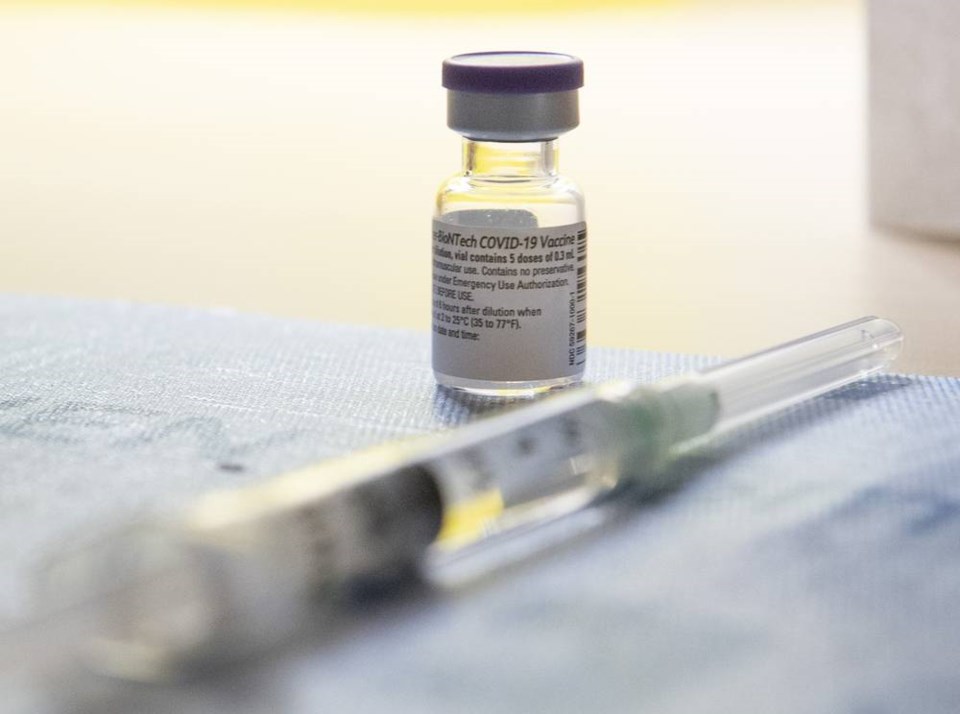The race is on to get as many people in B.C. vaccinated against COVID-19 as soon as possible.
As the government unveils the next steps in the biggest vaccination campaign in B.C. history, here are answers to some of the big questions.
WHEN CAN I GET THE VACCINE?
Vaccination clinics have been set up at major hospitals across B.C. as part of the first in a four-phase plan announced Friday by the province.
PHASE 1 — December to January
Those in Phase 1 of the province’s vaccination campaign include front-line health-care workers, including paramedics and emergency department personnel.
Health-care workers have also been going into long-term care and assisted-living facilities to vaccinate residents, staff and essential visitors. Remote and isolated First Nations communities are also receiving vaccinations as part of the campaign’s first phase, which is expected to continue into February.
PHASE 2 — February to March
Phase 2 of the vaccine rollout focuses on those age 80 and above.
Other groups slated to receive the vaccine in the second stage include:
• Indigenous communities not vaccinated in first priority group, especially seniors over 65
• People without a home or in a shelter
• Provincial correctional facilities
• Adults in group homes or mental health residential care
• Staff and recipients of long-term home support
• Hospital staff, community doctors and medical specialists
Starting in mid to late February, health officials will be reaching out to these populations with information on how to pre-register for a vaccination.
PHASE 3 — April to June
Phase 3 will begin vaccinating those ages 75 to 79, then those 70-74 before working backwards in five-year increments all the way down to people 60 years old.
Anyone who misses their place in line — say if their health doesn’t permit it at the time — is eligible to be vaccinated any time thereafter.
Any extra vaccine supply is expected to go to other groups, including such essential service workers as first responders, teachers, bus drivers, and people working in grocery stores.
PHASE 4 — July to September
In Phase 4, vaccines will be rolled out to the wider population, starting with those between age 59 and 55 and working back in five-year age groups until everyone over 18 is vaccinated.
Throughout the massive vaccination campaign, the province’s health-care workers will still be managing a pandemic, and that could necessitate vaccinating this younger cohort earlier.
Should an outbreak or cluster occur, say in work camps, prisons or factories, Immunize BC Operations Centre is reserving the flexibility to vaccinate clusters of people in order to control the spread of the virus.
The four-phase plan is based on already-approved vaccines and provincial health officer Dr. Bonnie Henry said Friday that the province has contingency plans should more vaccines get approved.

WHERE CAN I SIGN UP?
Most British Columbians do not yet have access to a COVID-19 vaccine.
But come March, segments of B.C.’s wider population can pre-register online or by phone. Anyone who pre-registers will get a reminder two to four weeks before they are eligible to book an appointment, with those deemed “clinically extremely vulnerable” first in line in April.
More information will be provided in the coming weeks, confirmed Immunize B.C. head Dr. Penny Ballem on Friday.
By March, vaccination clinics will be set up in 172 communities across B.C. Depending on the size of the community, vaccination clinics will take over stadiums, convention centres, arenas, community halls and school gymnasiums.
Mobile clinics in self-contained vehicles will roll into some remote communities and mobile teams will be available to reach home-bound individuals and hard to reach populations.
WHAT HAPPENS AFTER I GET MY FIRST DOSE?
After receiving their first dose, British Columbians will be provided with a paper record showing they’ve been vaccinated and telling them when to book an appointment for a second dose.
Reminders regarding a second dose will be sent out through email, text or over the phone, and booking can again be done online or over the phone.
Anyone vaccinated can sign up for a personal digital “immunization card” that can also be printed. Vaccination records will be stored in the Provincial Immunization registry, which can be accessed by the patient, public health and doctors.
WILL THERE BE ENOUGH VACCINE FOR ME?
The federal government has said it’s looking to achieve widespread vaccinations in the Canadian population by the end of September, and has announced contracts with seven suppliers to buy between 214 million and 398 million COVID-19 vaccines.
Of those, Canada expects to receive 60 million doses of the Pfizer and Moderna vaccines — enough for 30 million people — by September.
The remainder of the country’s 38 million people is expected to be covered by vaccines from manufacturers like AstraZeneca and Johnson & Johnson, though both are still under review for use in Canada.
In B.C., the volume of COVID-19 vaccine is expected to ramp up significantly over the coming months, from just under 800,000 doses earmarked for delivery between mid-December and mid-March to 2.64 million doses from April to June.
By the third quarter, that number is expected to skyrocket to 6 million doses — not including 20 million new Pfizer-BioNTech doses recently secured by the federal government and the possible inclusion of several more vaccine candidates.
IF I’VE HAD COVID-19, DO I NEED A VACCINE?
People have been shown to gain natural immunity to COVID-19 after being infected. But there’s still a risk you could get it again.
For that reason, health officials recommend everyone get the vaccine as soon as it is made available to them.
Last week, Henry said people who had been exposed in an outbreak situation but were not yet symptomatic were still being given the vaccine. Should they indeed fall ill with the virus, “it protects them from that second generation of cases,” she said.
WHAT ABOUT CHILDREN?
There are roughly 900,000 British Columbians under 18 in B.C. Unfortunately, no vaccine has yet been approved for this population in Canada.
That is likely to change as clinical studies progress. For example, Pfizer is currently conducting studies in children as young as 12, said provincial health officer Dr. Bonnie Henry.
The good news? Children are less likely to get infected and less likely develop severe illness due to COVID-19.
SHOULD I WAIT TO GET A COVID-19 VACCINE?
Immunize B.C. recommends speaking to a health care provider before receiving a COVID-19 vaccine if you:
• Have an immune system weakened by disease or medical treatment
• Have an autoimmune disease
• Are pregnant, may be pregnant or are planning to become pregnant
• Are breastfeeding
• Have received a monoclonal antibody or convalescent plasma for treatment or prevention of COVID-19
• Have received a vaccine in the last 14 days
• Have symptoms of COVID-19
If you have a new illness preventing you from your regular activities you should likely wait until you have recovered. This will help to distinguish the side-effects of the vaccine from a worsening illness.
— With files from The Canadian Press and Vancouver Is Awesome



